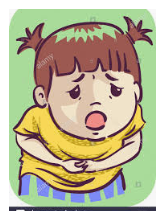Abdominal Migranes
 You’ve heard of migraines. Those bad headaches that are so severe that they may cause nausea, vomiting, sensitivity to light or sound, and may cause work or school absences. Most people know someone that suffers from migraine headaches or have them themselves. There is another type of migraine that you may not have heard about. Abdominal migraines. These are believed to be a form of a migraine, but instead of causing pain in the head, they cause pain around the center of the stomach, usually the belly button area with pain that is rated as moderate to severe.
You’ve heard of migraines. Those bad headaches that are so severe that they may cause nausea, vomiting, sensitivity to light or sound, and may cause work or school absences. Most people know someone that suffers from migraine headaches or have them themselves. There is another type of migraine that you may not have heard about. Abdominal migraines. These are believed to be a form of a migraine, but instead of causing pain in the head, they cause pain around the center of the stomach, usually the belly button area with pain that is rated as moderate to severe.
Abdominal migraines are mainly seen in children, anywhere from ages 2 – 11, which usually resolve or change to migraine headaches in their teenage years. The exact cause is unknown, but researchers believe it may be an issue in the brain-gut pathway, or endocrine (hormone) factors. Abdominal migraines seem to be more common in girls, in children whose parents suffer from migraine headaches, and in children who suffer from motion sickness. The triggers for both types of migraines can be similar: stress, excitement, anxiety, certain foods, lack of sleep, motion sickness or flickering lights.
Besides moderate to severe stomach pain, there are other symptoms which may accompany the pain including: cramping, nausea and vomiting, loss of appetite, pale skin, fatigue, headache and sensitivity to light and sound. The abdominal pain and other symptoms can last from one hour to several days. Keeping a calendar with notes about the pain will help your medical provider during the exam as abdominal migraines tend to follow a pattern; pain starting at the same time of day, pain lasting for the same amount of time, and pain that has the same intensity. There is no specific test that can diagnose abdominal migraines. Physicians may order blood work and imaging (ultrasound and endoscopy) to rule out other causes of abdominal pain before a diagnosis is made.
Many find that sleeping tends to bring relief during abdominal migraine episodes, especially in a dark, quiet environment. There are medications that have been found effective including over the counter pain relievers, prescription migraine medications, and tricyclic antidepressants. Cognitive behavioral therapy may also be helpful if stress is a trigger, and some physicians may recommend acupuncture as well.
Sometimes abdominal migraines can be associated with cyclic vomiting syndrome. Be sure to talk to a physician if your child is experiencing abdominal pain that is interfering with their daily activities. At GI for Kids, our team of providers are trained in a number of sub-specialties to address the unique medical needs of each patient. Call our office today to set up an appointment.
Written by: Mary Ellen McNeal, BSN, RN














